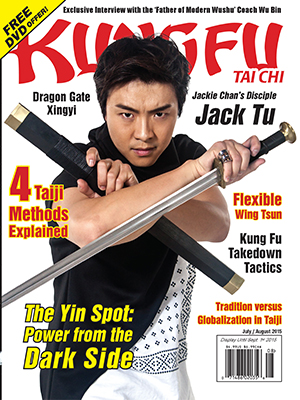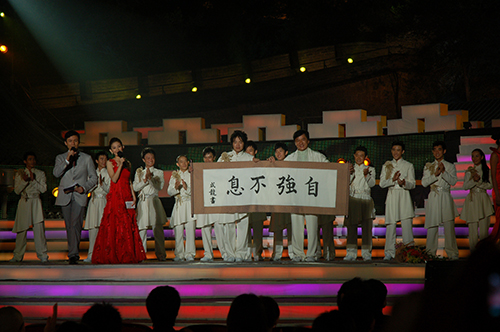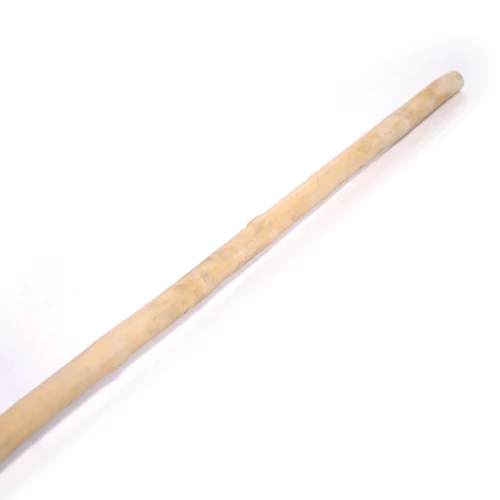By Gene Ching
Buy this issue now , or download it from Zinio
 Most Americans have no idea that Jackie Chan has a disciple. Longstanding Kung Fu Tai Chi readers know because we were directly involved from the beginning. For new readers, here’s a little recap.
Most Americans have no idea that Jackie Chan has a disciple. Longstanding Kung Fu Tai Chi readers know because we were directly involved from the beginning. For new readers, here’s a little recap.
Jackie Chan chose his disciple in a reality show, Jackie Chan’s Disciple (龙的传人). Production began in 2007 with a worldwide casting call. In America, three auditions were held: Los Angeles, New York and Fremont, California (hometown of our magazine). We supported the project through the Tiger Claw Foundation. 128 candidates were selected for weekly eliminations that narrowed them down to 16. Jackie Chan’s Disciple was filmed in Beijing, part of the pre-Olympic fervor that gripped the nation’s capital in 2008. One episode even took place in the Water Cube, the then newly constructed National Aquatics Center.
On July 27, 2008, Jackie declared Jack Tu the winner, formally accepting him as his disciple in a spectacular finale shot atop the Great Wall. Kung Fu Tai Chi had known Jack for years as an outstanding international competitor and the eldest son of Grandmaster Tu Jin-Sheng. Grandmaster Tu was our March+April 2003 cover master, most recognized for his Iron Crotch, a story that we first broke to America in 2001. Since then, Grandmaster Tu has stayed close, providing several articles, hosting a Special Skills Qigong competition at our Tiger Claw Elite KungFuMagazine.com Championship, and even creating some calligraphy for our Kung Fu Wisdom column (see page 98). Jackie Chan only chose one disciple, Jack Tu, but six top runner-ups of Jackie Chan’s Disciple joined Jack to form the New Lucky 7, a pop band in the tradition of Jackie Chan’s original childhood martial brothers, the Seven Little Fortunes (七小福).
And yet, for the winners, reality shows seldom live up to their promise. Of the thirteen winners of American Idol, only Kelly Clarkson, Carrie Underwood, Jordan Sparks and Phillip Phillips went on to achieve substantial chart-topping success. And after 18 seasons of The Bachelor and 10 seasons of The Bachelorette, only five of the twenty-eight couples remain together. But discipleship is a completely different matter, especially for a martial arts icon like Jackie Chan. In the traditional Chinese way of thinking, there is no divorce in discipleship.
Jackie, We Hardly Know Ye
Most Americans have no idea who Jackie Chan really is. They only know him by his Hollywood films. The last two were Kung Fu Panda 2 (2011) and The Karate Kid (2010). This is just a tiny glimpse of the magnitude of Jackie Chan. In China, Jackie is massive. In the last half decade, Jackie has starred in several other feature films: Shaolin (2011), 1911 (2011), Chinese Zodiac (2012), and Police Story 2013 (2013). His most recent film, Dragon Blade (2015), crushed the Chinese box-office. Directed by Daniel Lee (李仁港), it was one of China’s most expensive films to date and featured Hollywood stars John Cusack and Adrian Brody. (Never heard of it? Read this issue’s “Chollywood Rising” column on page 90.)
In Asia, Jackie is a brand name that embraces designer clothing lines, collector timepieces and even a K-Pop Boy Band called JJCC. There have been Jackie Chan signature cafes, restaurants and movie theaters. What’s more, Jackie is a major recording artist. His most recent song, “Wake up Winter,” was just released in March. It’s a rallying anthem, a major part of China’s bid for the 2022 Winter Olympics. On April 4, Jackie celebrated his 61st birthday with the release of a new autobiography, Growing Old Before Growing Up (only available in Chinese at this writing.) It is said that one can never see the whole dragon. In the same way, Jackie Chan—who is also known in China as Cheng Long (Cheng means “completed,” long means “dragon” 成龍)—is mostly outside American awareness.
Every student dreams of having a master like Jackie Chan; but for Jack Tu, it’s not at all like in the movies. Jackie isn’t like Simon Yuen (袁小田), Jackie’s perennial drunken movie master, and doesn’t subject Jack to absurd Kung Fu conditioning drills, the original “wax on, wax off” of martial arts training. Jackie Chan is a very busy man. “Jackie is always very supporting, saying, ‘Go out and find a way. Find your path,’” says Jack. “We cannot just stay beside him and tell him to pay our lunch, breakfast and dinner [laughs]. We have to make our own living.”

You Don’t Know Jack
When Jackie Chan’s Disciple ended, Jack got off to a rough start. “People think that we go out in private jets, that we have lots of money, lots of things [laughs]. They think like, ‘Now you are with Jackie Chan, you should have lots of opportunities. The movies have lots of money.’ But at the beginning, there was nothing. Nothing. It was all by ourselves.
“There was this time when we had lots of pressure—for over six years. People see us as what we are supposed to be like, but what we really are is like this. I can say half of us, the New Lucky 7, gave up already. They went to do what they are specialized in. And some of them just do the stunt doubles. But to me I say, ‘This is not what we should do.’ Our goal in there is not just to make some money and to live. Going in there, the first place is to be something like Jackie Chan.”
Given Jackie’s magnitude, this is a very tall order. As Jackie’s disciple, Jack needs to know more than just Kung Fu. Jack even has to know how to sing. “What Jackie will give us was clothes, jackets, pants, shoes, ordinary living items. But for opportunities, in the past we do lots of shows. The Seven Fortunes. But that’s not what we do. When we are dancing and singing, our inner voice is like, ‘WTF?’ [laughs]”
Today, things are better for Jack and the rest of the New Lucky 7. There’s less public scrutiny now so it’s gotten a lot easier. “After six years, all those things are gone. We’re thankful if we get famous at that time. I think after two or three years, we would be all gone. Because we went with too much pride. We thought everything was free for us. Everything was supposed to be given to us. Everything is mine. It’s not all yours. But now, that thing, I have to work hard to get it in order to be mine. It’s a good period of time to keep us trained. I think it’s inner mind training, so we don’t get too rushed. We don’t get thinking too much about certain opportunities. Instead we make ourselves strong and we establish the base of everything in order to have this opportunity come up.”
A Gangster and a Sparrow
Despite his world-famous master, Jack is shockingly absent on the web, at least in English. He is only mentioned in passing on Wikipedia in reference to Jackie, and his listings on www.imdb.com and the Hong Kong Movie Database (http://hkmdb.com) are woefully incomplete. Most of Jack’s work remains uncredited. Jack made quick cameos in some of Jackie’s Chinese films, including Little Big Soldier (2009) and Police Story 2013, but only Little Big Soldier is listed by most sources. A lot more has yet to be documented online.
Initially, Jack found work in television. He was featured in two popular martial arts TV dramas: Xin Ma Yongzheng (新马永真) and New Sparrow Number 3 (Xin Yanzi Lisan 燕子李三). Both are based on famous martial arts folk heroes. They are famous in China, but here, only Ma Yongzheng is recognizable, and only to American Kung Fu film fans. Ma was portrayed in the classic Shaw Brothers film The Boxer from Shantung (1972) starring Chan Koon Tai (January+February 2012 cover master) and most recently in Once Upon a Time in Shanghai (2014) starring Philip Ng. Ma was a famous gangster, akin to a Shanghainese Scarface (1983), a country boy who took over a major Shanghai gang through sheer grit and ruthlessness. But Jack didn’t land the title role of Ma. “They called me to be a villain, the bad guy, the Japanese guy. And I hated to be a Japanese bad guy. But they make me into a Japanese bad guy. During that time, I feel very frustrated. I’m Chinese. Why don’t you find a Japanese and tell him to be a bad guy?”
Nevertheless, it was a proving ground for Jack. “In Ma Yongzheng, they started doing action choreography, very wushu-ish. I was like, ‘I want to change it,’ and those guys were very startled because they know I’m a student of Jackie Chan, but they don’t know if I can do the things they do. And so this action choreographer starts challenging, ‘So if my camera is there, what are you going to do?’ I was like, ‘You can just put your camera there. I’ll go from behind—one versus ten—one shot and I’ll finish it.’ And he’s speechless because in China they don’t go by one shot. They have a lot of cuts. So suddenly he was messed up. So he says, ‘Show me how you’re going to do it.’ I choreographed this whole thing in ten minutes, and fight it two times. And the main director in the back saw it, the first time, and he was silent at the beginning. I was like, ‘Was that okay?’ The action director was silent too. ‘Do it again. One more time.’ So I did it the second time. And the second time, the director came up and patted the action director. ‘You see that kid? He just did one shot.’ And the action director went silent. So from that time, I earned the respect from all the action directors. And after that, all the shots I take, they asked me, ‘Hey, how you gonna fight? We don’t create your thing. You create your own thing.’ That time started building my reputation.
“I can be an actor but I can also help the action director do all the things. And for a Japanese, they don’t know Karate or Judo, so I start putting Karate and Judo into all of those fighting scenes and making it more Japanese. Because of this, I get a second job [Sparrow Number 3]—same thing as a Japanese bad guy. It’s not because I know Karate or Judo or all those Kendo things. You make me a Japanese bad guy again. They say, ‘No that was perfect. No one has ever played a Japanese bad guy like that.’ I was like, ‘Okay, I’ll do it a second time, but this time, I don’t want to die.’ They said, ‘Is this negotiable?’ I said, ‘No, you have to change the script. If I don’t die, I’ll do it.’ They said, ‘Okay, you don’t die. So how you gonna finish at the end?’ I say, ‘I’ll break my katana and I’ll say, “The Japanese lost,” and go back to my country’ [laughs]. So they let me change the script and let me choreograph the whole thing.”
Old Boys and Tea Masters
Jack’s next opportunity came with Old Boys: The Way of the Dragon (2014 老男孩之猛龙过江), and if ever something Chinese needed translation here, it’s this film. Old Boys came with a promotional single, “Xiao Pingguo” (“Little Apple” 小苹果), and the song’s video went viral—China-sized viral. Over 280,000 cover versions have appeared, racking up over 900 million views on Youku, China’s version of YouTube. It was even used as a recruitment video for the People’s Liberation Army. Sung by the Chopstick Brothers (筷子兄弟), a duo of Wang Taili (王太利) and Xiao Yang (肖央), the video is almost Lady Gaga-esque in its weirdness. Last November, Xiao Pingguo won the International Song Award at the American Music Awards and was hailed by the Hollywood Reporter as “the next ‘Gangnam Style.’”
“I did that one because of Daniel Lee. Siu Cheung Chan (陳兆祥), she is the one who produced 14 Blades (2010 錦衣衛), she saw me and called me over saying, ‘So you do martial arts and you’re from America?’ I say, ‘Yeah.’ And she said, “Daniel Lee saw your thing and he likes it. He would like to see what you have.’ I said, ‘What do you mean by “see what I have”?’ ‘We have this film called the Old Boys and we’re helping Chopstick Brother. Maybe you can come and see what you can do in there.’ Before this I was asking, ‘May I have a role?’ and then she’s like, ‘You’re nobody now, so you do nobody things.’ At that time I was like, ‘Ouch [laughs].’
“But then I was like, ‘Okay, I’ll do nobody things.’ You just come in and be a wuhang (‘martial actor’ 武行’) like a stunt double, because Daniel Lee, at that time, he was very famous. So I went in and then there’s one scene where the Old Boys, they’re northern Korean people so they have to do this northern Korean type of Kung Fu, Tang Soo Do. So I imported Tang Soo Do into the film. Daniel Lee was like, ‘What’s Tang Soo Do?’ I was like, ‘This is a northern Korean ancient type of Taekwondo.’ He was like, ‘Show me,’ so I do all these kinds of stuff. I study those from the books [laughs] because they said ‘northern Korea.’ I start learning them in three or four days. [laughs] I have to do my homework because all of these people, they know lots of stuff. Then he start talking to me, discussing with me the whole night, until morning. The action director was there too, and he said to the director, ‘The action director is here. Why do you need me?’ I was like, ‘No, no, no, you’re the action director!’
“After that night, Daniel Lee came to me and said, ‘Do you want to be my apprentice? I want to be your director Shifu (master 師父).’ I said, ‘I have a Shifu already, but I’ll think about it.’ [laughs] So that time we got along very well and I start choreographing the whole fighting scene in that film. Their stunt double is all me. It’s pretty fun because I’m choreographing the moves that I’m comfortable with and doing them all. I became good friends with the Chopstick Brothers too.”
Jack’s other project last year was Tea Fight (鬥茶), a film about dueling tea masters. “It’s not really an action film. It’s a romance, a rom-com. There’s a little action. The Wuyishan (武夷山) government created this film, and also their tourist department, to promote tea [Wuyishan is a mountain range in Fujian Province famous for tea]. Doing that film makes me not comfortable inside because it’s like one of those Taiwanese television dramas. Everyone can look cool and handsome. There’s thousands, millions of people in China that can do that. But why did you choose a person that can fight and do all these stuff, [to] just stand there and look at the camera and smile?
“After Tea Fight, I took a half a year break, just trying to ask myself what I want. [I] experienced different types of films and doing different types of roles, and it came to the conclusion I have to create one, to make one that I feel comfortable doing: Eye of the Desert. I hoping it will do well and we can do a China-U.S. co-production. I was going to be in Dragon Blade, but I turned it down. Daniel Lee phoned me and said, ‘Hey Jack, come to the set. I made a role for you.’ I was very happy at the time, but during that time I’m creating Eye of the Desert. The second day I phoned him and said, ‘Sorry, I can’t come. I’m doing this production for a film. I can’t do this.’ It was a very good opportunity for me, and he spent time writing this role—a martial arts assassin. In the beginning, I was very tempted to go, but there’s a voice telling me that if I go there, I’m just still background. I’m still the “nobody” because there’s too many people in the front. People went to the movie only to see those actors, but what’s in the background, it doesn’t matter. They don’t care. So I turned it down. I have to do something on my own. I have to show them what I have.”
Eye of the Desert and Vital Gate
Now Jack has two projects queued: Eye of the Desert, a kid’s film, and Vital Gate, an underground fight film. “In China now, there’s no kid’s action movies.” Jack gathered four of the New Lucky 7s and recorded a promo song titled, “Dance of Love.” “In one year, we raised our funds up to 6 million RMB in China…. And now we got more investors. We even have the investor who invested in Teenage Mutant Ninja Turtles. And also people from the government in China, they invested in us too. So we went from 6 million, now it’s going up to 15–20 million RMB in just half a year.”
Jack has been busily writing the script and calling in favors. The story is about a group of international treasure hunters who try to plunder a desert village. They discover that their high-tech devices won’t work in the remote desert. In the tradition of Jackie, it’s a family-friendly action comedy. Jack is partnering with Shi Xiaolong (釋小龍), the Shaolin-trained child star featured in our March 2000 story. “He was joking with me saying, ‘Hey, two of us combined (because my name in Chinese is Tu Shencheng (涂聖成)—my last one is Cheng, his last one is Long), we can be like Cheng Long (成龍)!’” Other talent is getting on board. “Liu Yifei (Crystal Liu from Forbidden Kingdom (2008) 劉亦菲) will help us do the promotion. Also Chen Guokun (a.k.a. Danny Chan, Legend of Bruce Lee (2008) 陳國坤) and the Chopstick Brothers…Daniel Lee is also going to help me with the film, being a producer… I also invited Jean-Claude Van Damme. He might come in and help us for one or two days.”
In Vital Gate (Mingmen 命門), Jack plays a U.N. peacekeeper who has just returned from Africa where his team was blown up. Suffering from PTSD, Jack’s character can only find work as a bank guard and gets caught up in corruption and underground fights. “They train fighters to create their own competition, like Wulinfeng (China’s televised Kickboxing show 武林風), like all those fighting competitions in China. And they fix the fight. They say, ‘Hey this guy is from Thailand, the King of Thai boxers, and this is the King of Karate,’ but they know nothing. They’re all just Chinese people trying to be Japanese or trying to be Thai. And they go in there and are just beat up by Chinese people. So they start challenging and lock me underground, and I have to find a way to get out.
“It’s going to start filming in Anhui and Shandong. And my dad is going to have a role in it too. There are lots of U.S. fighters. I’ve got lots of MMA fighters and UFC fighters, Zhang Jian (張建), a new China MMA fighter, and Liu Hailong (Sanda’s King of Kings 柳海龙) coming to help me too.” Just like in America, MMA fighters are starting to trend in Chinese movies. “Modern Wushu is going down, because modern Wushu to people is just dancing and acrobatics. Gymnastic people can do better martial arts. MMA and UFC is now invading China. There’s KFC now, Kung Fu Champion. It’s on the television. I was like, ‘Wow, why is KFC in black letters, not red letters?’ And then it came and people are fighting in a cage. ‘Oh. Kung Fu Champion [laughs]!’ They follow the UFC rules for that. It’s pretty funny.
“But I still want to keep it to traditional Chinese martial arts because in Vital Gate, everything is traditional martial arts. I don’t want to make it too UFC or too MMA like Donnie Yen. They have what they have but I use traditional martial arts, the pressure point fighting skill.” Vital Gate is targeting Chinese New Year 2016 for its premiere and a sequel is already in discussion.
Jack Tu or Jackie Two?
Old Boys and Tea Fight only played in Asia. Not much of Jack’s work has made it to America. Jack claims recently did some uncredited work for Outcast, which had a limited theatrical release in the U.S. last February. It is a Chinese-Canadian production starring Nicolas Cage, and being uncredited was a missed opportunity as being an international production, this film has extensive credits. However, it was panned by critics and did poorly at the box office on both sides of the Pacific. “I went down and helped them. I went there for a week. Liu Yifei was also in there too. It’s really bad. [laughs] I’m an army captain in there. I got killed by that Anakin guy, Hayden Christensen.” Most of Hayden’s movie victims wear full armor with face-obscuring helmets, so it’s impossible to see if Jack’s death scene even made the final cut.
But Jack remains undaunted and ambitious. He’s grateful that his celebrity status is limited to Asia. When he returns to America, he is unrecognized in public and can be normal. But that doesn’t keep him from dreaming. “I don’t want them to know that I’m Jackie Chan’s disciple. I want them to see me as the new rising action actor in Asia that’s going to replace all these old people—the next generation. I want to see people looking at Jackie and saying, ‘Hey, he’s Jack Tu’s master [laughs].’”
| Discuss this article online | |
| Kung Fu Tai Chi Magazine July + August 2015 |
Click here for Feature Articles from this issue and others published in
2015 .
Buy this issue now , or download it from Zinio
About
Gene Ching :
For additional material from this interview, read our online exclusives. Jack Tu: Jackie Chan’s Disciple in 2015: Part 1: Eye on the Gate and Jack Tu: Jackie Chan's Disciple in 2015: Part 2: Chollywood by Gene Ching."
![]() Print Friendly Version of This Article
Print Friendly Version of This Article
















